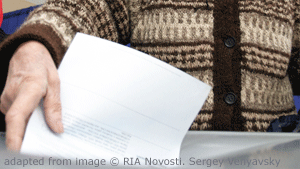European observers see pros and cons in current election campaign in Russia

file photo
MOSCOW - The observer mission of the Parliamentary Assembly of the Council of Europe (PACE) to the State Duma elections has pointed out to positive changes in the course of the current election campaign in Russia compared to 2007 but has also recognized several problems.
Most of the interlocutors of the delegation that stayed in Moscow to see the course of the election campaign believe that significant changes have taken place in the political process in Russia, namely the number of radio and TV debates has increased and the seven parties taking part in the parliamentary election are given more free time on the air and other opportunities, head of the mission Tiny Kox said at a press conference at the Interfax central office.
He said delegation members met representatives of Russian political parties involved in elections and also unregistered parties and NGOs.
Most interlocutors of mission members noted that compared to 2007 the situation has improved in the media sphere even though some said that this applies only to the political parties that have qualified for the elections.
Kox said that the interlocutors of the delegation had also spoken of a whole number of problems related to equal opportunities during the election campaign. For instance, even though political debates are conducted, as a rule they do not take place in prime time.
Besides, even though parties are allowed to buy time on the air in addition to free time on radio and TV, only parties with big financial resources can afford to do that. Non-parliamentary parties do not have such resources as they are not entitled to government subsidies.
Considering that seven political parties are taking part in the election, three of which are not represented in the State Duma, the possibility of real competition arises even though most parties complained about the United Russia party having administrative levers that it uses in its own political interests, Kox said.
In addition, the interlocutors of the delegation also named other problems - a more complex procedure of registering political parties, the high threshold in the State Duma elections and obstacles that parties face in election registration.
The majority of interlocutors with the exception of United Russia and Liberal Democrats, non-ruling parties, especially parties not represented in parliament, are placed in much worse conditions, he said.
In addition, some interlocutors expressed serious concern about the possibility of various manipulations during the elections.

